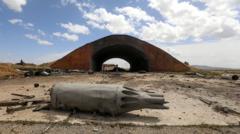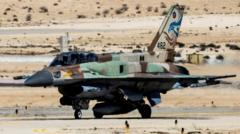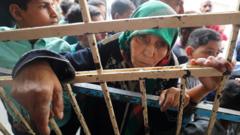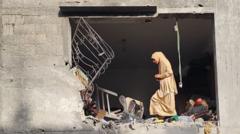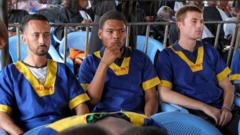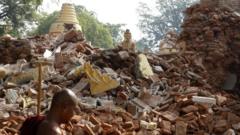**In the aftermath of a catastrophic war, Hezbollah's influence wanes as its leadership faces pressure from within and external forces challenge its military and political clout.**
**Hezbollah Faces Unprecedented Challenges Following Devastating War**
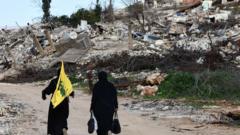
**Hezbollah Faces Unprecedented Challenges Following Devastating War**
**Tensions rise as the powerful militia grapples with internal dissent and a shifting geopolitical landscape.**
Despite being a formidable force within Lebanon, Hezbollah is at a pivotal moment, contending with significant challenges following a recent war that has severely weakened the group. As reported from southern Lebanon, the war, which saw widespread destruction and loss of life, has rattled Hezbollah's standing among its supporters and sparked internal debates about its future.
On September 17, tragedy struck when a nurse, identified only as Adam, received a dangerous alert on a pager provided by Hezbollah, meant for communication during emergencies. The device exploded, injuring Adam and a number of his colleagues in a bold operation conducted under an Israeli plan to decisively cripple Hezbollah's infrastructure. The incident not only resulted in personal tragedies but also highlighted the group’s vulnerability and the risks associated with its reliance on outdated technology to thwart surveillance from Israel.
Hezbollah, categorized as a terrorist organization by several Western nations, holds significant political and social influence in Lebanon. Despite Adam's determination to support Hezbollah, stating that his injuries symbolize a ‘medal from God,’ there are increasing whispers of discontent amongst the ranks. The group is no longer viewed as invincible; critiques now surface among its base regarding its military strategies and the recent war, which many are beginning to condemn as misguided.
The destruction in towns such as Kfar Kila, almost entirely decimated by Israeli airstrikes, has left numerous Hezbollah supporters questioning the leadership’s decisions. With 4,000 casualties reported and the humanitarian crisis deepening, the group struggles to provide adequate support for those affected. Reportedly, financial assistance offered has been insufficient, fueling unrest and a demand for greater accountability from the organization.
Additionally, Hezbollah faces mounting external pressures, notably from international allies seeking to curb Iran's influence in Lebanon. As Iran has been a critical lifeline for Hezbollah’s operations, any efforts to destabilize Tehran may lead to more significant repercussions for the group, which has relied heavily on Iranian resources for funding and military supplies.
Internally, with the passing of longtime leader Hassan Nasrallah, questions loom over the prospects of his successor, Naim Qassem, whose leadership lacks the same charisma. As discussions about disarmament gain traction and new Lebanese policies favor a stronger national military over non-state armed actors, Hezbollah's historical grip on Lebanese politics has begun to strangle.
While some remain steadfast supporters of the organization, urging resilience against external threats, the sentiment is increasingly tempered by fear of further violence and division in Lebanon, highlighting the critical atmosphere in which Hezbollah now operates. Amidst the rubble of once-thriving communities, the future of Hezbollah as a potent military force hangs precariously in the balance.
On September 17, tragedy struck when a nurse, identified only as Adam, received a dangerous alert on a pager provided by Hezbollah, meant for communication during emergencies. The device exploded, injuring Adam and a number of his colleagues in a bold operation conducted under an Israeli plan to decisively cripple Hezbollah's infrastructure. The incident not only resulted in personal tragedies but also highlighted the group’s vulnerability and the risks associated with its reliance on outdated technology to thwart surveillance from Israel.
Hezbollah, categorized as a terrorist organization by several Western nations, holds significant political and social influence in Lebanon. Despite Adam's determination to support Hezbollah, stating that his injuries symbolize a ‘medal from God,’ there are increasing whispers of discontent amongst the ranks. The group is no longer viewed as invincible; critiques now surface among its base regarding its military strategies and the recent war, which many are beginning to condemn as misguided.
The destruction in towns such as Kfar Kila, almost entirely decimated by Israeli airstrikes, has left numerous Hezbollah supporters questioning the leadership’s decisions. With 4,000 casualties reported and the humanitarian crisis deepening, the group struggles to provide adequate support for those affected. Reportedly, financial assistance offered has been insufficient, fueling unrest and a demand for greater accountability from the organization.
Additionally, Hezbollah faces mounting external pressures, notably from international allies seeking to curb Iran's influence in Lebanon. As Iran has been a critical lifeline for Hezbollah’s operations, any efforts to destabilize Tehran may lead to more significant repercussions for the group, which has relied heavily on Iranian resources for funding and military supplies.
Internally, with the passing of longtime leader Hassan Nasrallah, questions loom over the prospects of his successor, Naim Qassem, whose leadership lacks the same charisma. As discussions about disarmament gain traction and new Lebanese policies favor a stronger national military over non-state armed actors, Hezbollah's historical grip on Lebanese politics has begun to strangle.
While some remain steadfast supporters of the organization, urging resilience against external threats, the sentiment is increasingly tempered by fear of further violence and division in Lebanon, highlighting the critical atmosphere in which Hezbollah now operates. Amidst the rubble of once-thriving communities, the future of Hezbollah as a potent military force hangs precariously in the balance.

